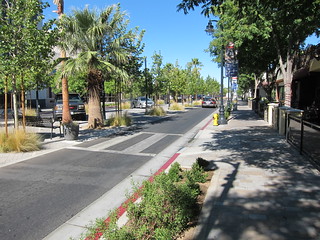 It has been a productive year for the Safe Routes Partnership in Southern California. This year, the Southern California team was off and running with a full-blown campaign at the Southern California Association of Governments (SCAG) to increase funding for active transportation in the 2012 Regional Transportation Plan and Sustainable Communities Strategy (RTP/SCS). We were successful in tripling the funding for active transportation, and with our partners, created a post-implementation motion that was adopted by the SCAG Regional Council. The motion directed SCAG staff to pursue additional active transportation planning efforts.
It has been a productive year for the Safe Routes Partnership in Southern California. This year, the Southern California team was off and running with a full-blown campaign at the Southern California Association of Governments (SCAG) to increase funding for active transportation in the 2012 Regional Transportation Plan and Sustainable Communities Strategy (RTP/SCS). We were successful in tripling the funding for active transportation, and with our partners, created a post-implementation motion that was adopted by the SCAG Regional Council. The motion directed SCAG staff to pursue additional active transportation planning efforts.
SCAG is proving itself to be a great partner and has made significant strides to address the concerns raised during the RTP/SCS process. Since the adoption of the RTP, SCAG has created a new Active Transportation Department and is currently hiring an Active Transportation Manager to lead its efforts over the next several years. In addition, SCAG created subcommittees to develop policy frameworks and collect stakeholder input on public health, active transportation, sustainability and transportation finance. As an official member of the SCAG Active Transportation Subcommittee, the Safe Routes Partnership is helping to direct SCAG’s work plan and leveraging additional resources for active transportation across the state.
The Safe Routes Partnership has also expanded our network throughout the seven counties in Southern California. We have met passionate new partners from local community based organizations and developed new relationships with transportation planning and public health agencies. Working with county public health agencies in shaping transportation policy and planning has been a productive partnership. These agencies have brought their expertise in modeling and data analysis to the table and their input is helping to change the way transportation outcomes are measured, including equity, environmental and public health groups. We believe that including strong public health, equity and environmental performance measurements will not only engage transportation agencies in the public health dialogue but also help inform cost benefit decisions around specific transportation policies.
We are excited for the new year in Southern California. Next year will bring a flurry of work at the local level as we begin providing expanded technical assistance to Kaiser Permanente’s HEAL Zones. We will also be expanding our work with each of the County Transportation Commissions as they develop policies ranging from Comprehensive Transportation Plans to possible Complete Streets policies at SANDAG and LA Metro. We are excited to see the support for Safe Routes to School continue to grow across Southern California and hope our successes here can inspire other regions of the country to focus on health, safety and fun while they plan their transportation systems.
Region


